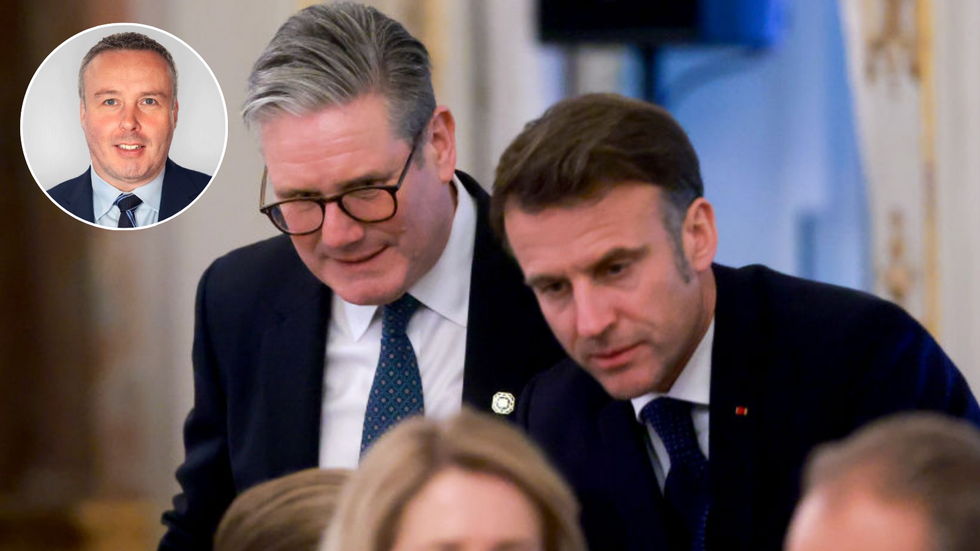10,000 North Korean troops preparing to enter Ukraine War
GB News
GB News Home Affairs Editor Mark White delivers his analysis of the state of play between Europe, the USA and Russia
Don't Miss
Most Read
Trending on GB News
In Europe's capitals, senior politicians have long been braced for the inevitable Trump showdown over Ukraine, but the rapid and brutal nature of the US approach has left those leaders reeling and scrambling to remain relevant in any peace process.
US Vice President JD Vance warned last week "there's a new sheriff in town" and it's clear, even long-serving deputy sheriffs are not safe from the Trump administration's pot-shots, with European nations slammed over their commitment to defence and democracy.
As US Secretary of State Marco Rubio begins preliminary talks with Russian officials in Saudi Arabia, European representatives have not been invited, and it's clear they feel snubbed.
Instead, as they battle to remain relevant in any future decisions over Ukraine, key Europeans leaders are now gathering for an emergency session in Paris to thrash out their response to any Trump driven peace deal.
Sir Keir Starmer believes the UK could play a pivotal role, providing British forces for any future peacekeeping force in Ukraine.
In truth, Europe is likely to have little say in any eventual deal to end the war. Instead, their role will be to make the best of any plan and help enforce that deal.
 Europe is in a battle to remain relevant - but in truth, its the least of its worries - Mark White analysis
Europe is in a battle to remain relevant - but in truth, its the least of its worries - Mark White analysisFor the new Trump administration, the current approach makes prefect sense.
Under the Biden administration, the US and European nations have had no meaningful contact with the Kremlin since the main invasion of Ukraine almost three years ago.
In contrast, the US and its allies have been intimately involved with Ukraine since the outbreak of war, and has a far better understanding of Kyiv's concerns and red-lines.
The Trump administration sees the meeting in Saudi Arabia as a fact finding mission, exploratory talks, which it's hoped will pave the wave for full blown negotiations.
At that point, the Ukrainians would be a key party in those negotiations.
However, even then the Europeans are unlikely to be much more than observers in a US brokered process.
Former Trump official Fred Fleitz has said he believes today's Paris summit is a collective European temper tantrum, as leaders feel increasingly sidelined.
In truth, Europe has few meaningful options in the process ahead.
Although, Sir Keir Starmer and many of his counterparts on the Continent have pledged their long-term commitment to Ukraine's defence, few believe Europe has the capacity or resolve to step-up and fill the considerable gap which would be left if the US decided to withdraw its military and economic support.
For the past three years the combined support of the US, Europe and some others has been just enough to prevent Ukraine from losing the war, but never enough to achieve victory.
If Ukraine finds it impossible to stomach any US backed peace deal, and if President Trump orders the withdrawal of support as a result, would the Europeans really go it alone?
The Ukrainian President Volodymyr Zelensky urged the Continent's leaders last week to establish a proper European army.
But in doing that, and boosting their military support for Ukraine, European nations would have to dig deep into their own pockets and put their own defence industries on the type of war footing they have long talked about, but have so far failed to achieve in any meaningful way.
A peacekeeping commitment seems by far the best option Europe has in remaining relevant in Ukraine's future.
But make no mistake, even a so called "reassurance force" as it's been dubbed by Keir Starmer and other, is a massive endeavour for Europe's armed forces, struggling with chronic structural issues after decades of under funding.
The scale of that task becomes startlingly apparent when you look at the likes of efforts of the US in Korea. 25,000 US troops are permanently involved in protecting the de-militarised zone (DMZ) between North and South Korea.
The border between Ukraine and Russia is more than five times longer.
A force of at least 100,000 would be required in any Ukrainian peacekeeping mission.
And that force needs to be multiplied three-fold.
For every 100,000 troops in Ukraine, another 100,000 will have been on post deployment, on leave and then training. Another 100,000 would be in pre-deployment preparation and training.
And Europe's senior military leaders will still remember the mess that was the policing operation in Bosnia.
British and French troops were often left powerless to prevent Serb attacks, with their terms of engagement not fit for purpose, and a general lack of equipment and resources.
Volodymyr Zelensky may have to make some unpalatable choices in the weeks ahead.
There are no good options in ending the war in Ukraine.
Europe's barely hidden anger and embarrassment about being frozen out of that process are the least of the issues the main parties have to grapple with.







